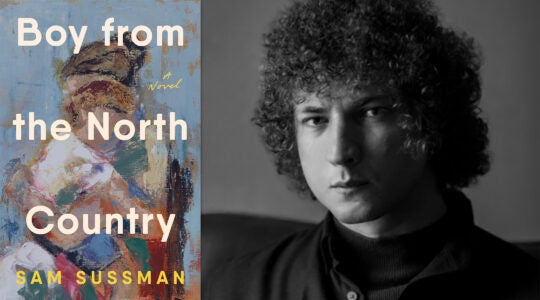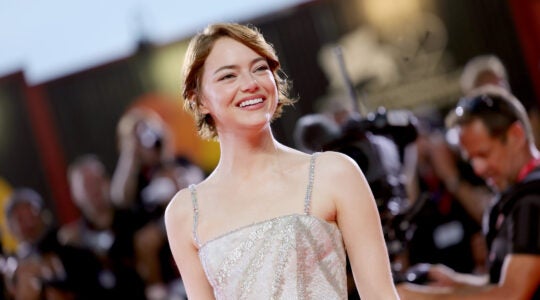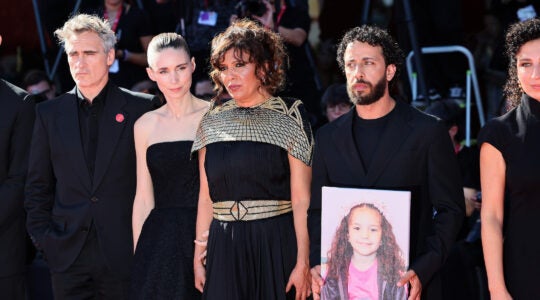
Hani Naser began playing the oud at 7 and still has the same nearly 70-year-old instrument. (Rebecca Spence)
TOPANGA, Calif. (JTA) — Few world musicians get to play with rock bands, but 15 years ago, Hani Naser christened his new electric oud performing “Blister in the Sun” with The Violent Femmes.
In May, when the 1980s folk-punk band reunited at the Bottlerock Music Festival in Napa Valley, Calif., Naser joined in again, strutting his stuff alongside Femmes front man Gordon Gano, this time playing the hand drums.
A master percussionist and oud player, Naser has made music with the likes of Ry Cooder, Bonnie Raitt and Santana. But he’s also used his talents to advance peace in the Middle East.
Along with Israeli music legend David Broza, Naser has performed across Israel and, in 2011, at a unity concert at Sinai Temple in Los Angeles. The pair were even invited to perform for King Hussein and Prime Minister Yitzhak Rabin to commemorate the signing of the Israeli-Jordanian peace treaty, but Rabin was assassinated before the concert took place.
In an email, Broza described Naser as “one who deeply wants to see peace in the world.”
“His playing is unique,” Broza said. “It fuses Arabian rhythms and Western grooves.”
Naser’s comfort in different cultures can be traced back to his birth in the mountain village of Ermameen, Jordan. Naser is the son of a Christian family with roots in Nazareth whose ancestors are said to have converted from Judaism some 2,000 years ago. At 7 months old, the family moved to New York.
He spent his childhood in suburban Westchester County and as a teenager would take the train into Manhattan, staying out all night to hear Bob Dylan, Joan Baez and the beatnik poets who were fixtures at the clubs and cafes of Greenwich Village in the 1960s.
At the same time, Naser was exposed to Latin rhythms at the city’s Cuban and Flamenco clubs. At home, he heard the sounds of such Arabic music legends as Oum Kalthoum and Fairuz.
“It was a melting pot of cultures,” Naser said. “As a musician, it was like cooking an amazing meal, with a little spice from here, a taste from there.”
When Naser, who prefers not to give his age, is not touring with The Violent Femmes or Broza, he’s playing with his own Hani Naser Band, which he describes as a “world music jam band.”
On a recent Tuesday morning, after rolling a joint and fixing a cup of fresh mint tea (served in a small glass cup, as is the Middle Eastern custom), Naser showed off one of his most prized instruments: a hand drum covered with the skin of a Nile perch and decorated with the English words “Peace through Music” on one side and the Arabic words for “Arts and Ecstasy” on the other.
“I never cared for politics because it led to one thing and one thing only — how to overpower the other side,” Naser said. But with music, “there’s a whole other mindset that kicks in. It’s not about the politics or the military strategy, it’s about what people are feeling.”
Naser has no formal music training. At 7, he began playing the oud after his mother returned from Jordan holding the pear-shaped string instrument in her hand. He still has the nearly 70-year-old instrument, which he plays every morning on the patio of his Topanga Canyon home, a rustic, airy paradise perched high above Los Angeles.
Naser credits his love of rhythm in part to listening to his grandfather, Abu Farham, recite poetry as he ground freshly roasted coffee beans with a wooden stick each morning. Naser was just a toddler at the time, but the sounds infused his spirit, and by the time he was in high school, he had started his own rock band.
“I didn’t know it was world music,” he said of his adolescent venture. “But that’s what it was.”
In the 1990s, while touring with guitarist David Lindley, Naser got a call from Seeds of Peace, the nonprofit organization that brings together youth from war-torn regions for conflict resolution work at a summer camp in Maine. Naser jumped at the chance to work with the group and soon began playing benefit concerts.
Since then, he’s also performed benefit concerts for the joint Palestinian-Jewish village Neve Shalom/Wahat al-Salam, or Oasis of Peace, co-founded by Broza’s grandfather. And in 2004, Naser played a concert in support of land-mine survivors at the U.N. General Assembly.
Asked whether he’s frustrated by the slow pace of peace in the Middle East and the many lost opportunities since he was invited to play for Hussein and Rabin, Naser shook his head.
“There was a possibility for peace,” he said. “And when you know it’s possible, you know it can happen again.”
JTA has documented Jewish history in real-time for over a century. Keep our journalism strong by joining us in supporting independent, award-winning reporting.





